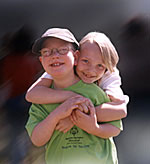Fertility, Infertility, and Reproductive Health The Demographic and Behavioral Sciences Branch (DBSB) supports social and behavioral science research on fertility and infertility, as well as aspects of reproductive health including pregnancy and disease prevention, contraception, and sexuality. Fertility Research In the area of fertility/childbearing, specific interests include the following: - Studies of the quantity, timing, and circumstances of childbearing, including:
- Trends and differentials by race/ethnicity, socioeconomic status, and other characteristics;
- Fertility in relation to the timing and characteristics of marital and informal intimate unions; and
- Fertility in relation to other life course domains and trajectories, including education, work, residential mobility, and health.
- Studies of the policy, social, economic, cultural, psychological, and biological factors and processes that influence fertility, fertility motivation, and fertility planning.
- Studies of the consequences of the quantity, timing, and circumstances of childbearing for the well-being of adults, children, families, communities, societies, and nations.
Contact: Christine Bachrach or Rosalind King Infertility Research In the area of infertility, specific interests include the following: - Studies of processes within social, institutional, economic, and cultural contexts that influence:
- Diminished fecundity;
- Help-seeking and diagnosis patterns and processes;
- Treatment access and decision-making;
- Variations in pregnancy attainment, characteristics, and resolution; and
- Short- and long-term consequences of infertility or infertility-associated treatment for women, men, couples, and children.
- Studies of social, economic, and policy factors that generate disparities in infertility and infertility treatment.
- Research on psychological processes during the experience of infertility and intervention studies aimed at improving individual or couple well-being.
Contact: Rosalind King Reproductive Health Research In the area of reproductive health, interests include topics related to pregnancy and disease prevention, contraception, and sexuality, such as: - Population-based studies of behaviors related to the risk of unwanted pregnancy/birth and STI infection, including:
- Onset and trajectories of sexual activity, contraceptive use, and sexual partnerships;
- Partnership dynamics and characteristics, including partner selection and the negotiation of protected sex;
- Contraceptive use dynamics and effectiveness; and
- Unintended, mistimed, and unwanted pregnancies and their outcomes.
- Studies of the social, institutional, economic, and cultural contexts that affect sexual behavior and reproductive/disease outcomes, and the processes through which such effects operate.
- Research on the interrelationships between pregnancy prevention and disease prevention.
- The consequences of sexual behaviors and related aspects of reproductive health for individual well-being, interpersonal relationships, reproductive outcomes, and the well-being of families, communities, and society.
- Intervention studies that are theoretically grounded in one or more of the scientific issues above.
- Methodological research to develop and improve methods for studying sexual behavior, including reliable and unbiased measures, data collection methods that improve validity of self-reports, and methods for validation of self-report data.
Contact: Susan Newcomer For more information on the NICHD’s research in these areas, see also:
|
|
